Table of Contents


Want to Boost Rankings?
Get a proposal along with expert advice and insights on the right SEO strategy to grow your business!
Get StartedA sharp drop in ChatGPT’s reliance on live web searches for anonymous users has been observed in new research by SISTRIX.
According to their analysis, the percentage of ChatGPT responses pulling data directly from the web plunged from above 15% to below 2.5% in just two weeks.
The finding has triggered questions about how OpenAI is reshaping the product and what it means for AI visibility in search.
- What Did SISTRIX Report About ChatGPT’s Decline in Web Lookups?
- How Does SISTRIX Measure Web Usage in ChatGPT?
- What Changed in September That Could Explain the Drop?
- Why Might OpenAI Reduce Web Reliance for Anonymous Users?
- How Does This Impact Users and AI Search Visibility?
- Is This a Temporary Drop or a Long-Term Shift?
- What Are the Bigger Implications for SEO?
- Looking Ahead: What Should Marketers and Users Expect?
Free SEO Audit: Uncover Hidden SEO Opportunities Before Your Competitors Do
Gain early access to a tailored SEO audit that reveals untapped SEO opportunities and gaps in your website.

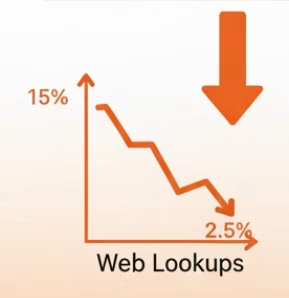
But what exactly changed, why might it have happened and how should users interpret it?
What Did SISTRIX Report About ChatGPT’s Decline in Web Lookups?
SISTRIX, a well-known search visibility and SEO data provider, said it has been running daily spot-checks of ChatGPT responses across a range of prompts.
In those checks, it noticed a steep decline in the share of responses that triggered a live web lookup.
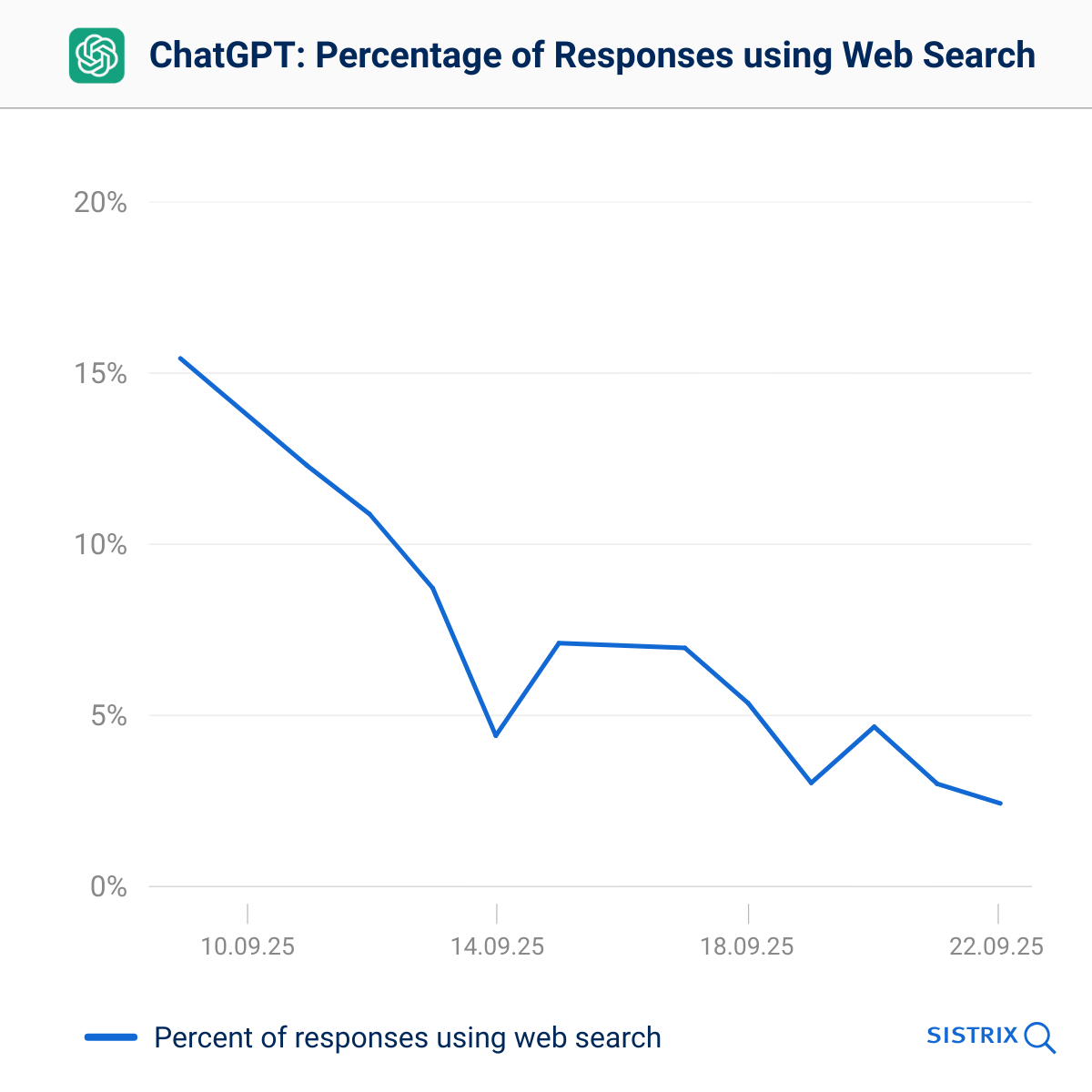
The pattern was clear:
- Before mid-September: More than 15% of anonymous ChatGPT queries called the web.
- By late September: That number had dropped to below 2.5%.
SISTRIX was careful not to assign a specific cause.
The company also noted that its measurement applies to anonymous sessions and in other words, when users interact with ChatGPT without logging into an account.
How Does SISTRIX Measure Web Usage in ChatGPT?
While SISTRIX shared the headline numbers, it did not publish its full methodology. The company didn’t reveal:
- The sample size of prompts tested.
- The exact queries used.
- The detection method for determining when ChatGPT used a web lookup.
Instead, SISTRIX described its process as analyzing “numerous ChatGPT responses to a wide variety of prompts” each day.
That means the findings should be treated as an independent observation, not a confirmed technical change from OpenAI.
Still, the scale of the drop from 15% to under 2.5% is significant enough to raise eyebrows across the SEO and AI communities.
What Changed in September That Could Explain the Drop?
There are several relevant developments in the AI and search ecosystem around the same time:
OpenAI’s Release Notes
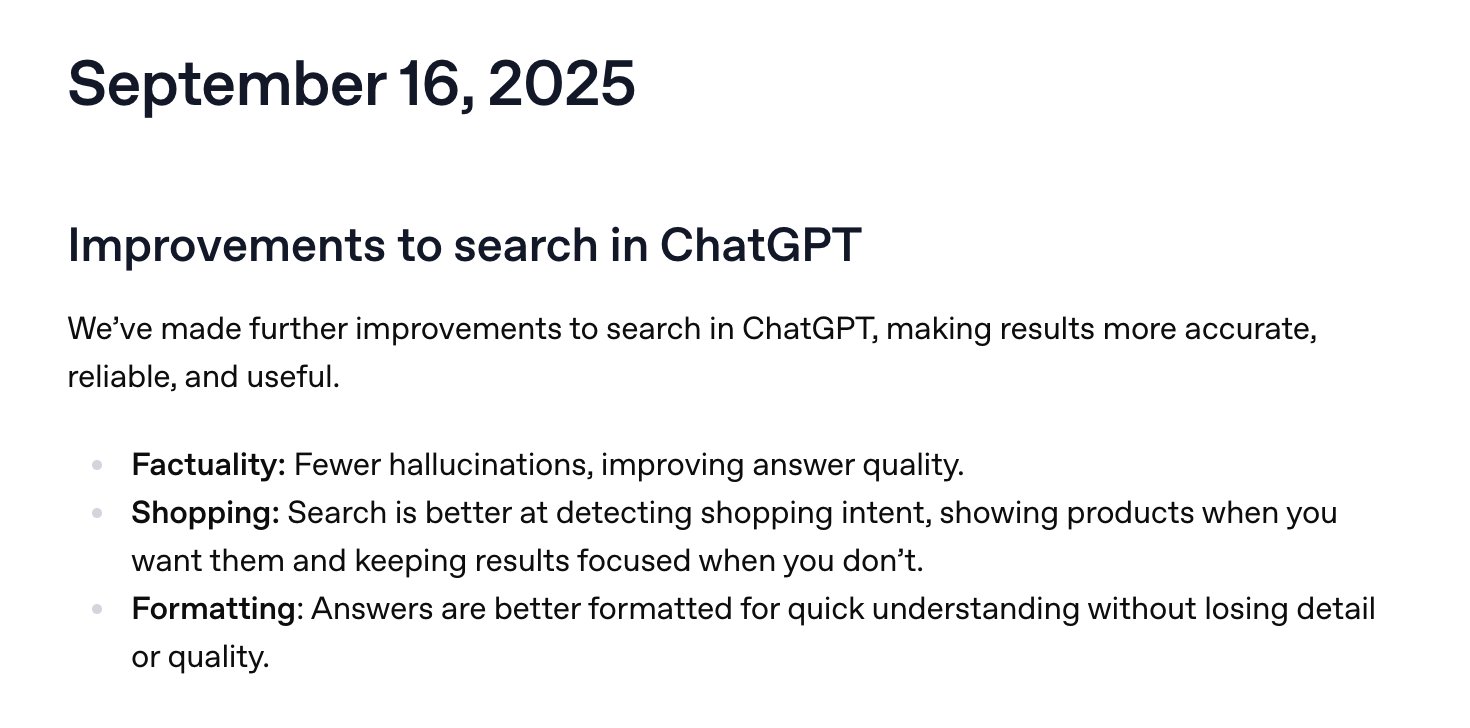
On September 16, OpenAI published release notes mentioning “improvements to search in ChatGPT.”
No details were provided about the backend or the data sources. While this might explain the timing, OpenAI has not confirmed that it relates to the observed drop.
Bing Search API Retirement
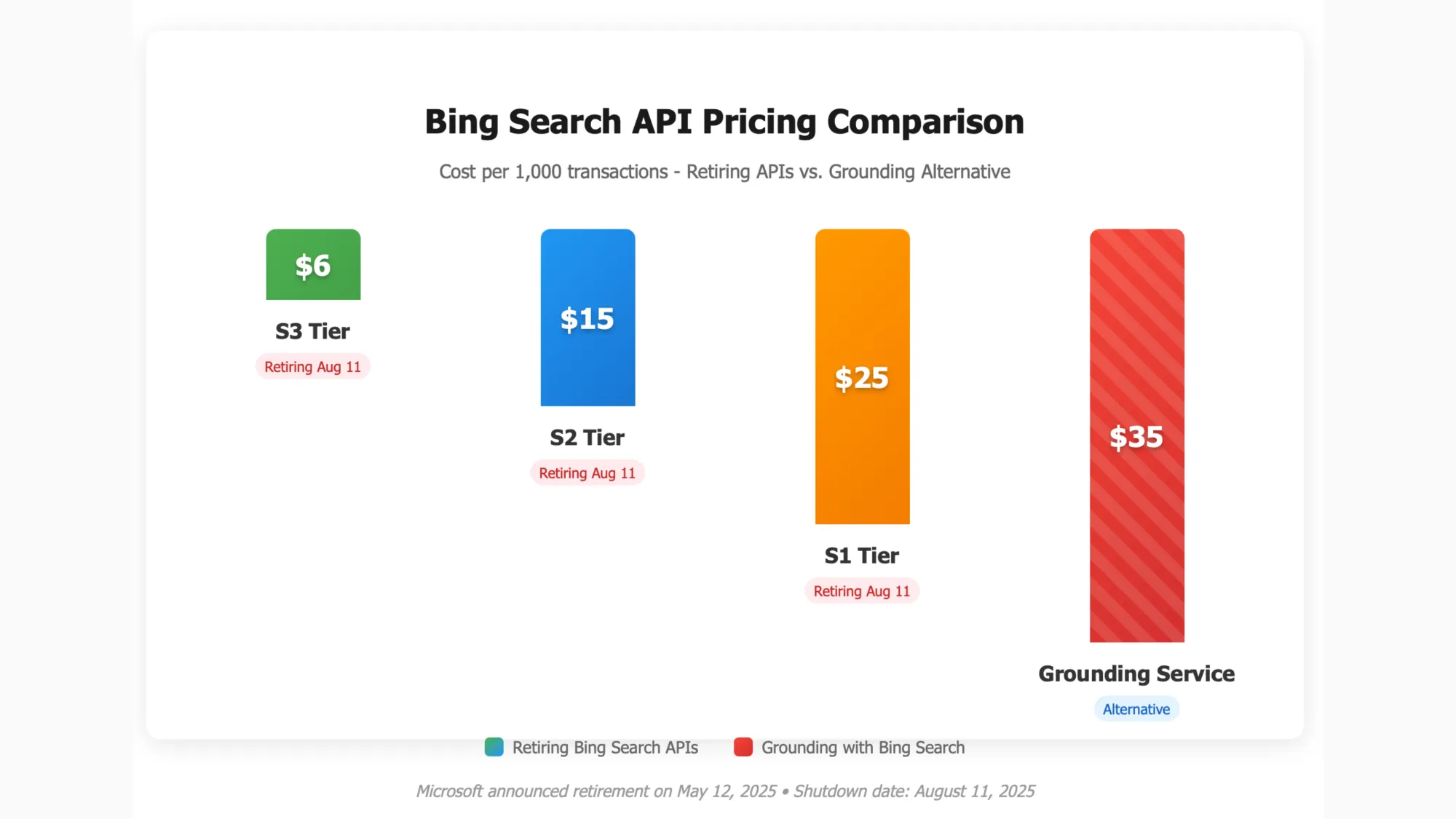
Microsoft officially retired its Bing Search APIs on August 11. ChatGPT has historically relied on Bing for its web lookups.
Some third-party tools have already migrated to alternatives but whether this impacted ChatGPT directly remains unproven.
Google SERP Access Changes
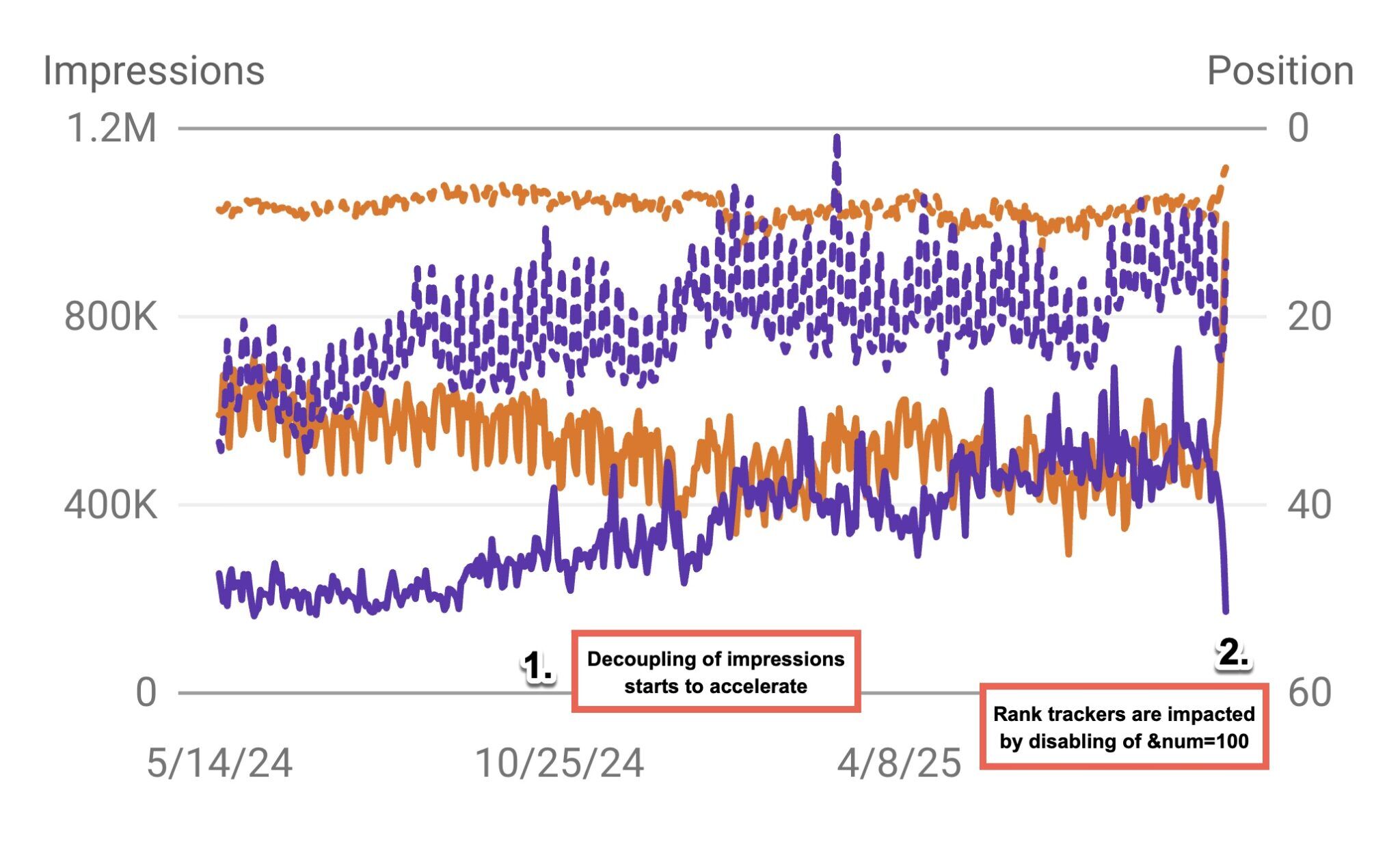
Around the same time, SISTRIX separately documented a change in Google’s SERP output. The old “num=100” parameter was retired, which meant scrapers and tools could no longer easily fetch 100 results per query.
Instead, Google now defaults to 10 results per request, raising the cost and effort of data collection.
Individually, none of these explain the SISTRIX numbers outright. But together, they paint a picture of an evolving search landscape where access to reliable real-time web data is becoming more complex.
Why Might OpenAI Reduce Web Reliance for Anonymous Users?
One possibility is cost efficiency. Live web lookups add significant computational overhead compared to relying on the model’s trained knowledge.
For anonymous users, who are not paying customers—OpenAI may be experimenting with scaling back real-time search usage to conserve resources.
Another possibility is product strategy. Logged-in users, particularly Plus or Enterprise subscribers, may continue to see higher rates of live web use.
By reducing web lookups for anonymous sessions, OpenAI could be nudging more users toward creating accounts or upgrading.
There is also the question of data trust and quality. With Bing APIs retired and Google tightening access to its SERPs, it may be harder or more costly to maintain anonymous real-time search at the same scale.
How Does This Impact Users and AI Search Visibility?
For everyday users, the most noticeable change is that ChatGPT may cite fewer live sources in its answers when accessed without logging in.
Instead, responses will lean more heavily on the model’s internal training data.
That means:
- Anonymous users might miss out on the latest news or updates.
- Cited sources may appear less frequently in answers.
- Businesses and publishers hoping to gain visibility through AI references could see less representation in these sessions.
For logged-in or paid users, the experience may differ. SISTRIX only measured anonymous sessions, so it is unclear whether the same decline applies across all accounts.
Is This a Temporary Drop or a Long-Term Shift?
This is the question everyone is asking. At present, there are no official comments from OpenAI about the frequency of live web lookups.
SISTRIX itself described its findings as limited to a specific timeframe and sample.
The cautious conclusion? It is too early to call this a permanent shift. More independent testing is needed to confirm whether this was a temporary dip, a technical adjustment or a strategic product change.
What Are the Bigger Implications for SEO?
If AI platforms like ChatGPT are indeed reducing their reliance on live web data at least for certain users it could reshape the SEO landscape in several ways:
- Less Real-Time Citation
Websites may appear less often in AI-driven answers, reducing exposure opportunities. - Heavier Reliance on Historical Content
AI might lean more on training data, meaning fresh content has fewer short-term opportunities to surface. - Greater Divide Between Anonymous and Logged-In Users
Businesses may need to consider how their content is represented differently depending on user type and account level.
Ultimately, this reflects a growing tension: AI platforms want to deliver fresh, accurate answers, but they also face technical, cost and licensing challenges in sourcing live web data.
Looking Ahead: What Should Marketers and Users Expect?
Right now, the safest interpretation is that SISTRIX observed a sharp short-term decline that deserves further study.
Whether it signals a new normal for ChatGPT or simply a temporary blip remains unknown.
Marketers should:
- Monitor how often their content appears in AI-generated answers.
- Keep track of OpenAI’s release notes and product updates.
- Prepare for a future where AI visibility may depend less on real-time crawling and more on how well content aligns with LLM training data.
For users, the practical impact is simple: if you want ChatGPT to access the latest information, logging in or subscribing may provide a different experience than using it anonymously.
About the author
Share this article
Find out WHAT stops Google from ranking your website
We’ll have our SEO specialists analyze your website—and tell you what could be slowing down your organic growth.














